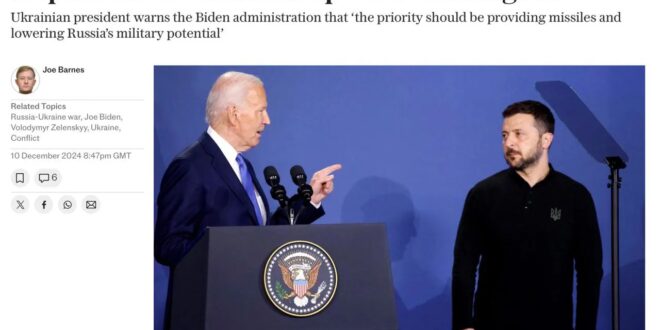The main narrative line of interest today comes by way of the tensions which have come to a boil over the US and Zelensky’s disagreement on lowering the age of mobilization. For months now it has simmered until reportedly coming to a full-on clash:
This is the one area Zelensky has shown backbone of late, completely refusing to bend to his masters’ will on this issue, partly because he’s aware the trap being set for him. Washington wants nothing more than to use Ukrainian cannon fodder to weaken Russia and Zelensky is finally catching up to the ploy: now he’s only willing to lower the age in a quid pro quo for much more military arms.
He made this much known in an official post:
There’s a lot of discussion in the media about lowering the draft age for Ukrainians to go to the frontlines. We must focus on equipping existing brigades and training personnel to use this equipment. We must not compensate the lack of equipment and training with the youth of soldiers.
The priority should be providing missiles and lowering Russia’s military potential, not Ukraine’s draft age. The goal should be to preserve as many lives as possible, not to preserve weapons in storages. The decision was first broken by Ukrainian Pravada last month:
Wherein Zelensky tried to calm public fears of an impending mobilization with a speech at the Rada, stating:
And no need for speculation: our state is not planning to lower mobilisation age. We have to use a new approach to [army] contracts to gradually rely on contracts rather than mobilisation to shape our army."
Details: Zelenskyy also said that he has instructed the Ministry of Defence and military leadership to select and appoint a new Military Ombudsman (Commissioner). He stressed that defence forces have to have internal resources to address the issue of soldiers’ rights violation.The claimed workaround would be to totally redesign the conscription process to include—according to other Ukrainian officials—better “incentives” to voluntarily join, as well as various new PR campaigns to spur volunteers.
The problem is, a new BBC piece laid out a devastating data point: that Ukraine actually has very few under-25s due to the fact that the 90s saw a sharp decrease in birthrates. We’ve covered this before here, but essentially it means the cohort of males born from the mid to late 90s onward is very small compared to the older groups.
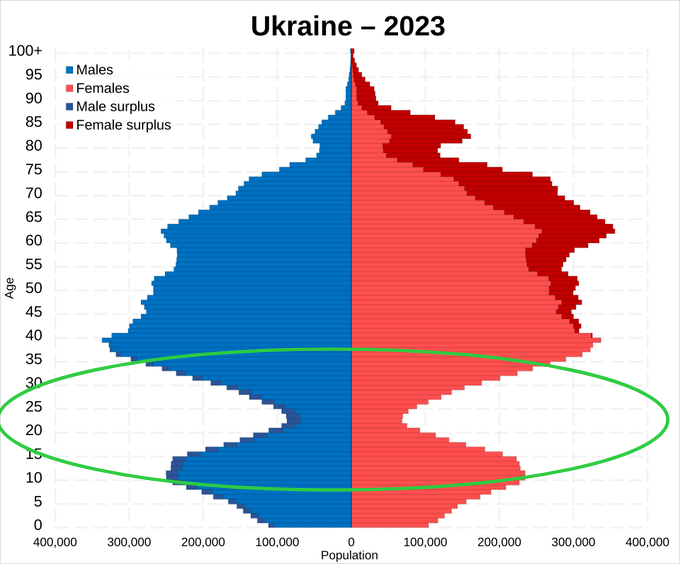
As such, BBC implies that lowering the mobilization may not be enough to succeed as it would not yield as many men as necessary.
The article likewise again confirms that current mobilization no longer even covers losses. Since we’ve seen official figures of 20-30k monthly mobilizations, we can infer losses are higher than that.
Sources of the Ukrainian service of the BBC in the General Staff previously reported that the current rate of mobilization does not cover even losses.BBC links to another of their own articles which showed proof that Ukraine has already been forcibly mobilizing men under 25 in many cases.
BBC Ukraine has found out why such situations arise and under what conditions men under 25 can be mobilized.
The main conclusion is that due to legislative nuances, boys under 25 who are unfit for service in peacetime due to health problems and have documented this, can be mobilized in wartime.There’s even a whole other category of reservists under-25 eligible for mandatory mobilization:
Currently, persons liable for military service between the ages of 25 and 60 and reservists (even if they are under 25 but have served in the regular army) are mobilized to serve in the Armed Forces, but not conscripts (except for volunteers). During martial law, there is no conscript service in Ukraine.The big question is, how large has this ‘stealth’ mobilization of under-25s actually been, and what percentage has it already mobilized? Perhaps, for all we know, Zelensky has already tapped the under-25 pool to such an extent there’s not much left there, which could explain his aversion to ‘officially’ undersigning mobilization of a cohort he’s already secretly plundered.
This slant is somewhat supported by an interesting portion of the opening Telegraph article, which states:
Mobilising men is out of the question
For Kyiv, mobilising men between 18 and 24 is completely out of the question.
The age group makes up less than 10 per cent of Ukraine’s population, with around two million men making up that pool.
In comparison, 25-54-year-olds constitute approximately 44 per cent of the 36.7 million population.Think about that logically for a second: the 18-24 cohort is the smallest, yet the largest cohort of the 25-54 year olds has already run dry to the point of requiring the opening of a new tap. So if the largest one is decimated, how quickly would the smallest one face the same fate?
This line of thinking is further supported by the addition in the article that the lowering of mobilization age from 27 to 25 was expected to net 200k troops. So: 200k for the two-year block. But recall, the under-25 cohort has the smallest population. Let’s say it remains 200k or less for each additional two-year span. That means from 25 to 23, 23 to 21, 21 to 19 should consequently net under 600k more troops—or realistically, far less; at least if we’re going by the article’s implications. Realistically, they further imply Ukraine has mobilized far less than desired, and so each two-year block may in fact net them as little as 100k or even less, which would imply another 300k maximum men available. This would buy Ukraine what, another year or year-and-a-half at most?
Either way, it has now come to a deadlock where the US is essentially making the mobilization an imperative condition of further weapons deliveries, while Ukraine is countering: weapons first before mobilization. Who will win this game of ‘chicken’?
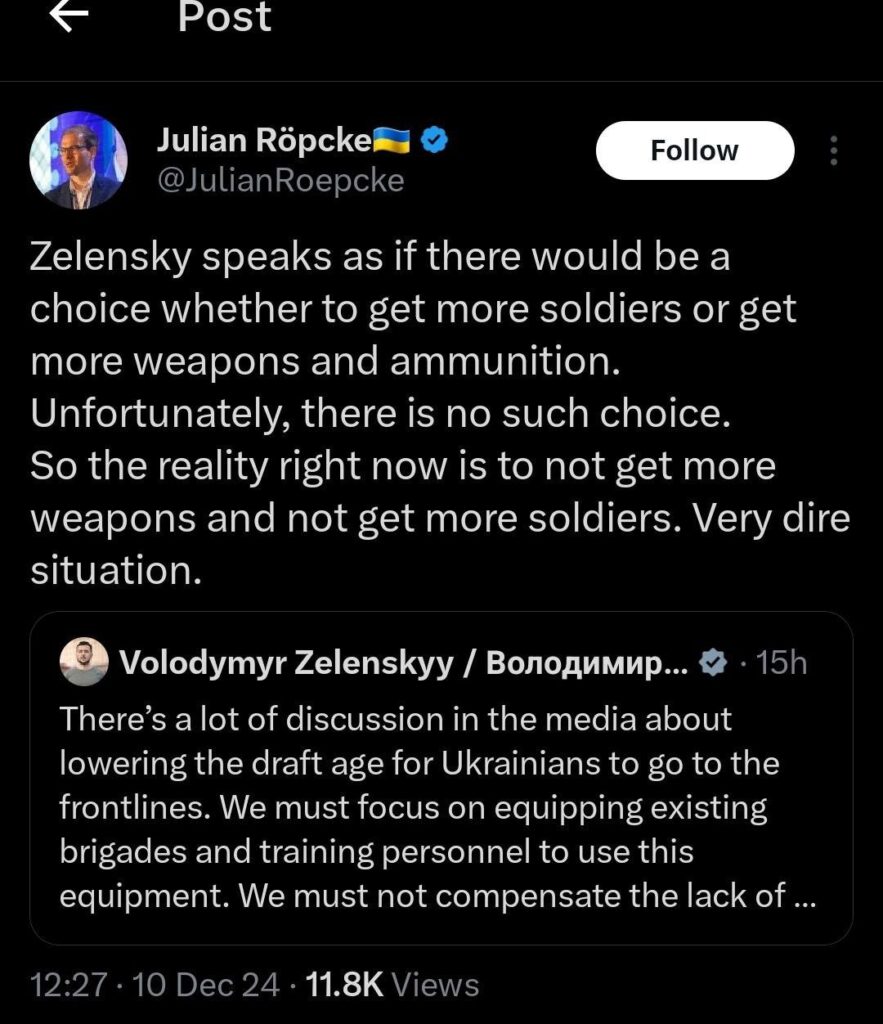
However, for the sake of full fairness, we present the new MediaZona ‘study’ which claims that Russia, too, is now suffering from a major decline of recruitments:
Using alleged federal budget data for recruitment bonuses, they’ve come up with this chart:
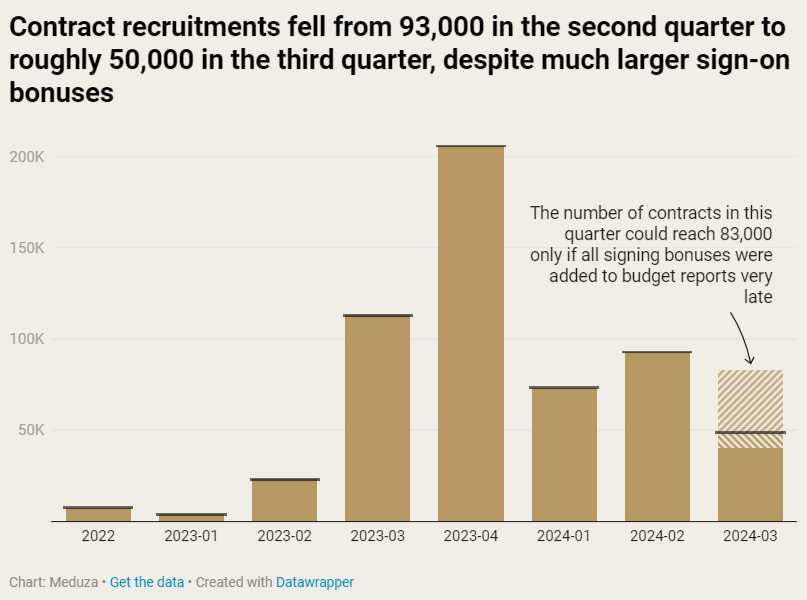
According to this, first and second quarter of 2024 achieved about 70k and 95k recruitments, which would be ~23,000 to ~33,000 per month. Recall Russian officials repeatedly gave a figure of about ~30k per month recruitment.
Now MediaZona claims it has dipped to around 40k a quarter, which would be a mere ~13k a month—but they admit there’s still room for it to reach its previous number if “signing bonuses are added to the report late.”
Firstly, there may be a delay between a contract being signed, the signing bonus being paid out, and the inclusion of these expenses in budget reports. One indirect indication of this is the sharp rise in payments reported in the final quarter of each year, when the budget must be “closed out.”In short, according to the above, they may be trying to make a ‘crisis’ out of an accounting technicality. Toward the end, using another methodology, they admit the new number could be around 83k, which is still almost 28,000 per month—not exactly a catastrophic drop.
In fact, there are easy explanations for why Russia would not be gunning for previous highs: not only have Russian ‘reserve armies’ already been filled—which were a previous objective—but even Russian losses appear to be at conflict lows, contrary to Western screeching.
Note: the last few months always get ‘revised up’ later as losses are confirmed retroactively, but it still paints a fairly mild picture.
Ukrainian propagandists, like this ex-Forbes writer, on the other hand, continue to tell wildly tall tales. Here it is claimed that the battle of Pokrovsk, thus far, has generated some of the largest Russian losses “in history” compared with any previous military conflict:
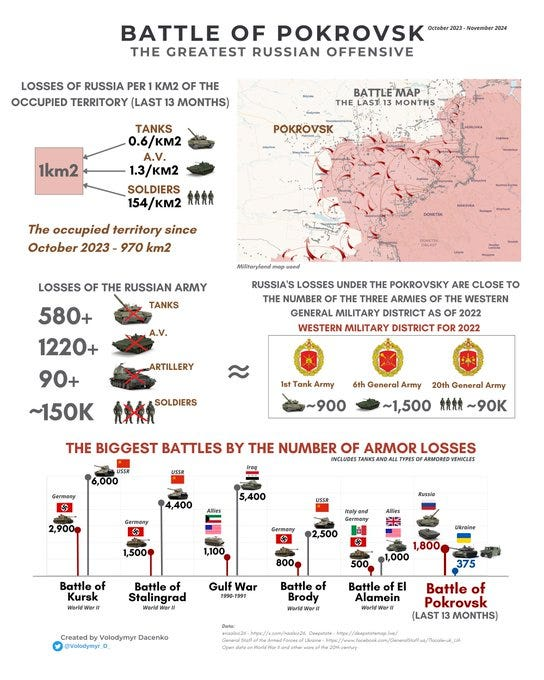
The graphic claims over 150,000 Russian troops and almost 2,000 armored vehicles were lost just in the Pokrovsk direction alone, which begins to compare to the Battle of Stalingrad, amongst others. Wow!
Songs will be sung.
Now in light of everything, Macron is reportedly traveling to Poland to discuss a 40,000-man peacekeeping force for Ukraine:
The meeting of the two EU heavyweights comes amid increasing fears that the incoming administration of Donald Trump will force the Europeans to pick up more of the military responsibilities in Ukraine.
“It is true,” confirmed the EU diplomat when asked about a Polish media report in the Rzeczpospolita newspaper claiming the two countries were talking over a potential 40,000-strong peacekeeping force composed of troops from foreign countries. The diplomat did not elaborate on which countries the soldiers might come from.The article admits a senior Polish official shot down the rumors saying it would not be possible to carry out such a bilateral decision, as such a significant motion would be the purview of the UN or the Organization for Security and Cooperation in Europe.
This is more strutting from Macron, whose vanity desperately requires him to appear at the forefront of geopolitical breakthroughs. The real reason for this latest ‘strategic ambiguity’ hype—which the article does allude to—is simply the fear that Trump will dump Ukraine and Europe will need to act in some way to prevent total collapse.
Zelensky replied:
Ukraine "may consider" Macron's proposal to deploy Western troops as a security guarantee, - Zelensky
▪️In his opinion, this could be a solution before Ukraine is admitted to NATO, which Kyiv insists on. Zelensky intends to discuss Ukraine's invitation to the Alliance again with Biden soon.
▪️"And we talked about the fact that even if there is such a pause, while Ukraine is not in NATO and even if we had an invitation and we were not in NATO, and there is such a pause, what will happen during this time? Who will guarantee us any security? And I will tell you frankly, we can think about and work on Emmanuel's position. Remember, he proposed that some part of the troops of this or that country be present in some territories of Ukraine, which would guarantee us security while Ukraine is not in NATO? But before that, we must have a clear understanding of when Ukraine will be in the EU and when Ukraine will be in NATO," Zelensky told reporters at a meeting with German Chancellor candidate Merz.
▪️Zelensky also confirmed that he, Trump and Macron spoke "about a frozen conflict" and security guarantees.
➖"I said, we want the war to end more than anyone else in the world. And, of course, a diplomatic end to the war will save more lives. And we want that," the president said.
▪️Trump's team does not support inviting Ukraine to NATO, so Zelensky will try to get it before the end of Biden's presidency.The currently discussed play is that NATO is completely off the table, and so some kind of “security guarantee” must be handed to Ukraine in order to convince Zelensky of peace talks.
The real reason would be to try and deter Russian breakthroughs from capturing Odessa and the rest of Ukraine once the AFU begins total collapse. But of course, that always leads to the big question of what European “peace keeping forces” would actually do once Russians advance on them. Will they dare fire on Russian troops if their mere presence fails as deterrent? Of course they wouldn’t because they would not have anything even approaching a real long-term combat logistics backend for a real war in place. That means any sort of actual kinetic exchange against Russia would be ruled out. Peace keeping troops are generally provisioned for short tours and would be decimated or driven out easily no matter how large their ostensible numbers are.
One analyst notes:
40.000 would be a catastrophe. A few days ago, the Ukrainian army estimated the number of Russian troops deployed in Ukraine to be 800,000. Now, these officials are considering deploying 40,000 peacekeepers to counter the Russian advance. This makes me think that they expect respect and fear from the Russian troops. This reinforces Trump's statement about Europeans being completely dependent on the US military. However, deploying 40,000 men would be less than what Ukraine sent to Kursk, and they are losing land every week.In fact, just in the Pokrovsk direction alone, Ukraine has recently claimed Russia has concentrated over 150,000 troops.
The signals coming out of Trump’s administration continue to be rather poor for Ukraine. First Mike Johnson remarked that he would not support further funding for Ukraine:
Sure, the Treasury announced a gradual disbursement of Russia’s ‘frozen’ $20B today—but a subsequent NYT article reported Trump could cancel this upon entering office.
Reminder: the $20b “loan” is not taken from Russia’s actual frozen assets, but from the interest profits generated from them. However, Russia’s “frozen” $200-300b are incapable of generating $20b interest, particularly in the year or two they’ve been frozen, as that would suggest an impossible 10% yearly return. This means the money sent to Ukraine could essentially be a kind of collateralized loan from “future projected interest” generated by the frozen funds. However, if Trump reverses sanctions as the NYT article suggests, the whole thing would crash, particularly since the $20b is meant to be meted out in gradual tranches over time. In short, it’s a lot of hocus pocus meant to make it sound like Russian funds are being used when the reality is not even close.
Afterwards, Trump’s pick for head of FBI Kash Patel gave a hint toward the previous theory that Trump would initiate a kind of audit of Ukraine, then dump the country after deeming it to be a corrupt money sink:
Recently, it was said Trump did not even want to meet Zelensky in Paris but was infact pressured into doing so by Macron. The meeting itself reportedly produced no breakthroughs or anything of worth, but turned into an anodyne formality.
For his part, Arestovich has claimed in a new video that a ceasefire will begin immediately after Trump’s January 20 inauguration. He believes the US retains massive leverage capabilities to push Russia into negotiations at any time:
—
But what’s next in the near term future until then?
There continue to be big rumors from the Ukrainian side that Russia is planning to storm the Dnieper River to seize Kherson, allegedly having prepared “300 boats” for the operation:
From Nikolayev governor Kim himself:
The Russian army is preparing to force the Dnieper and storm Kherson, - Kim
▪️The Nikolaev Governor "confirmed the information" about the preparation of the Russian Armed Forces for a landing on the right bank of the Dnieper and for the storming of Kherson.
➖"Regarding the information about the Russians storming the right bank of the Dnieper. We had this information for a long time, 4 months ago, and were preparing. The military also understands everything. We will respond in accordance with the situation," Kim said.
▪️He admitted that this could be a diversionary tactic
▪️Earlier, the Kherson governor said that the Russians had already assembled 300 boats to cross the Dnieper.Financial Times subsequently covered it, additionally quoting head of Kherson regional military administration Oleksandr Prokudin:
Another officer said Russian forces were slowly hopping islands to inch closer toward Kherson’s bank as run up to this:
▪️Speaker of the Ukrainian Volunteer Army "South" Serhiy Bratchuk said that the Russians continue to try to occupy the islands on the Dnieper in order to get closer to the western bank of Kherson. They recently carried out a large-scale attack on Kazatsky Island, which is not far from Nova Kakhovka.
▪️Ukrainian officials suspect that the attack on Kherson is part of Russia's plan to increase pressure on Kyiv before Trump's arrival.That said, Kim had earlier mentioned that this whole thing could merely be a diversion to keep Ukrainian troops in the region pinned and on their toes so they’re not sent as reinforcements to hotter fronts like Pokrovsk.
—
Now Russian forces continue to breakthrough around Pokrovsk, slowly encircling the city from the south:
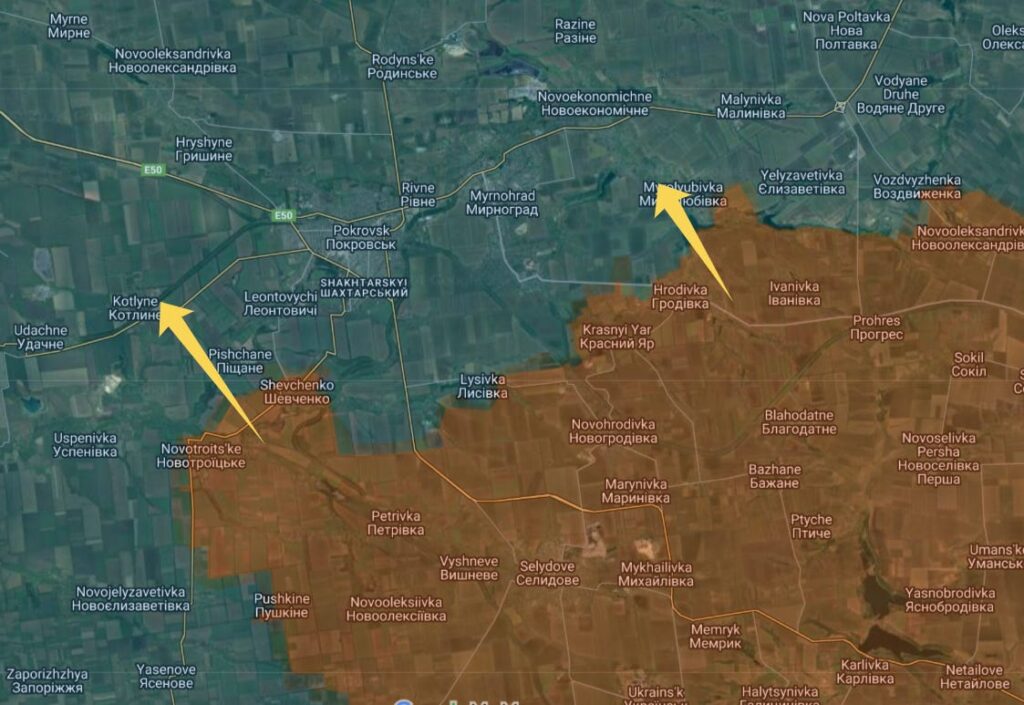
Infamous Ukrainian journalist Butusov has reported that a major ring of fortifications has already been bypassed by Russian forces due to AFU incompetence:
Near Pokrovsk, a powerful fortified area was built for the Ukrainian Armed Forces, but no soldiers were sent there, and the Russians took it without a fight.
This was reported by journalist Yuriy Butusov.
"Near Pokrovsk, they built a key, finally good fortified area, for several tens of millions of hryvnia, but they did not have time to send our soldiers there due to certain inadequate management decisions by the command," Butusov said.
"Now, the key, tactically speaking, fortified area has already been captured by the enemy, without a fight. He entered it before the military command sent even one person there. As a result, tens of millions were spent, and our command gave this entire fortified area to the Russian troops," he added.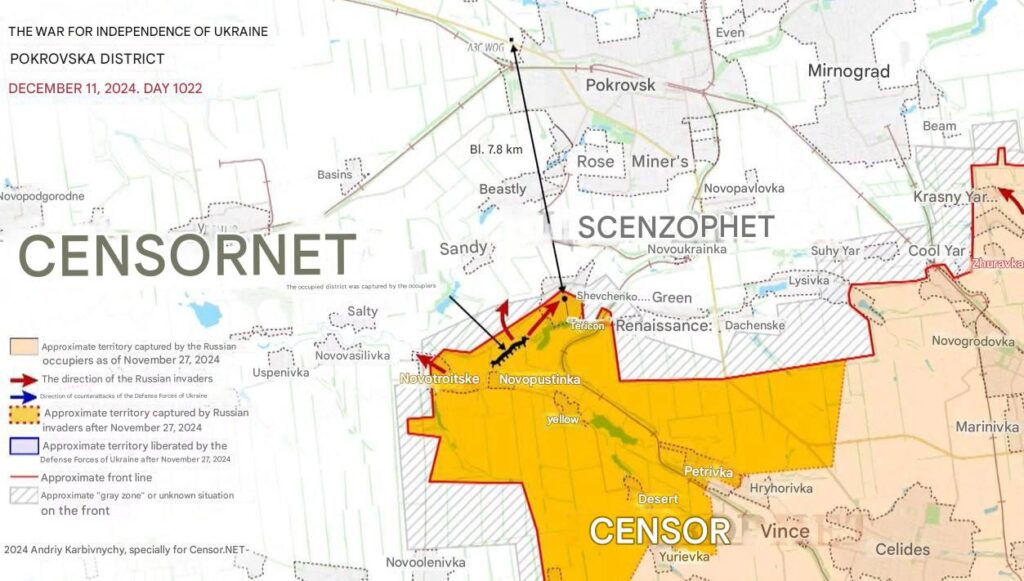
A few last items:
American MSM shows great concern for Ukraine’s “massive casualties”:
—
Ukraine’s Minister of Finance says if US stops aid, Ukraine can hold out to the middle of 2025:
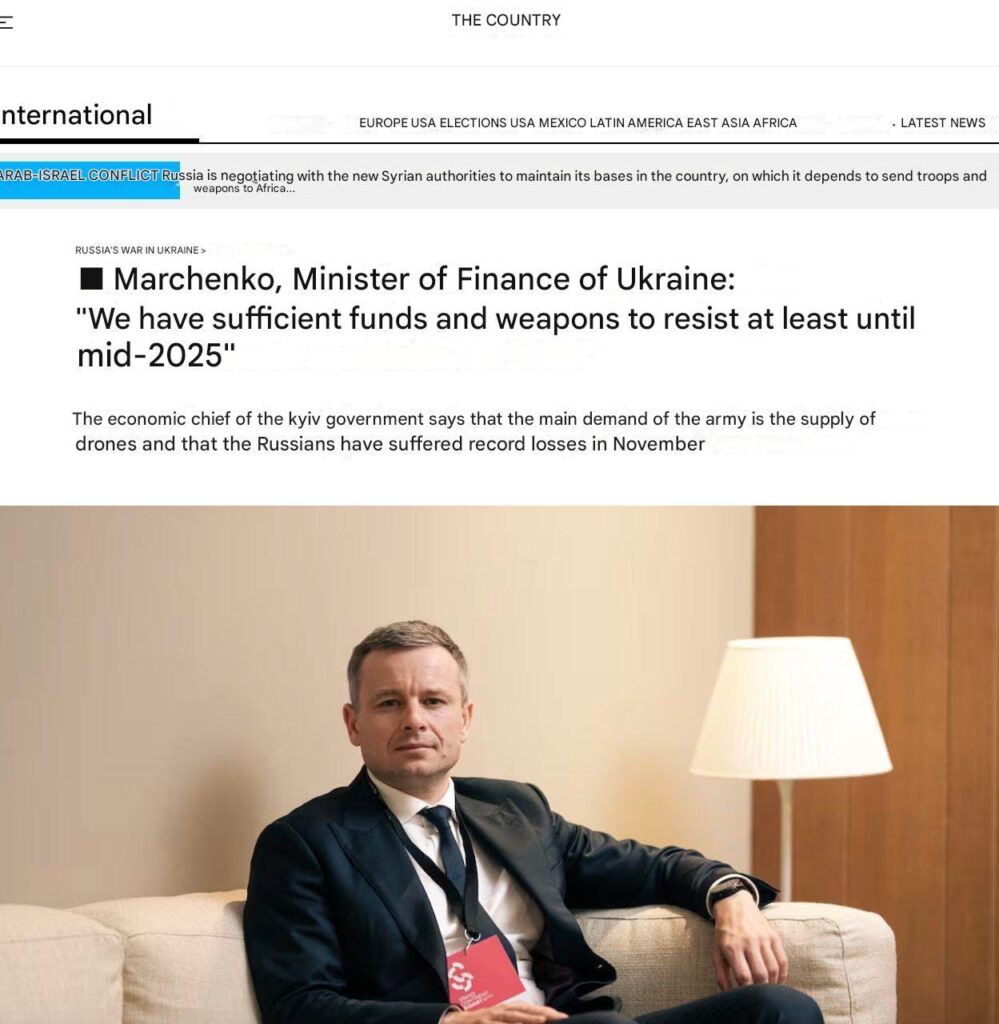
Ukraine shared a chart of fired Russian munitions over the past year plus:
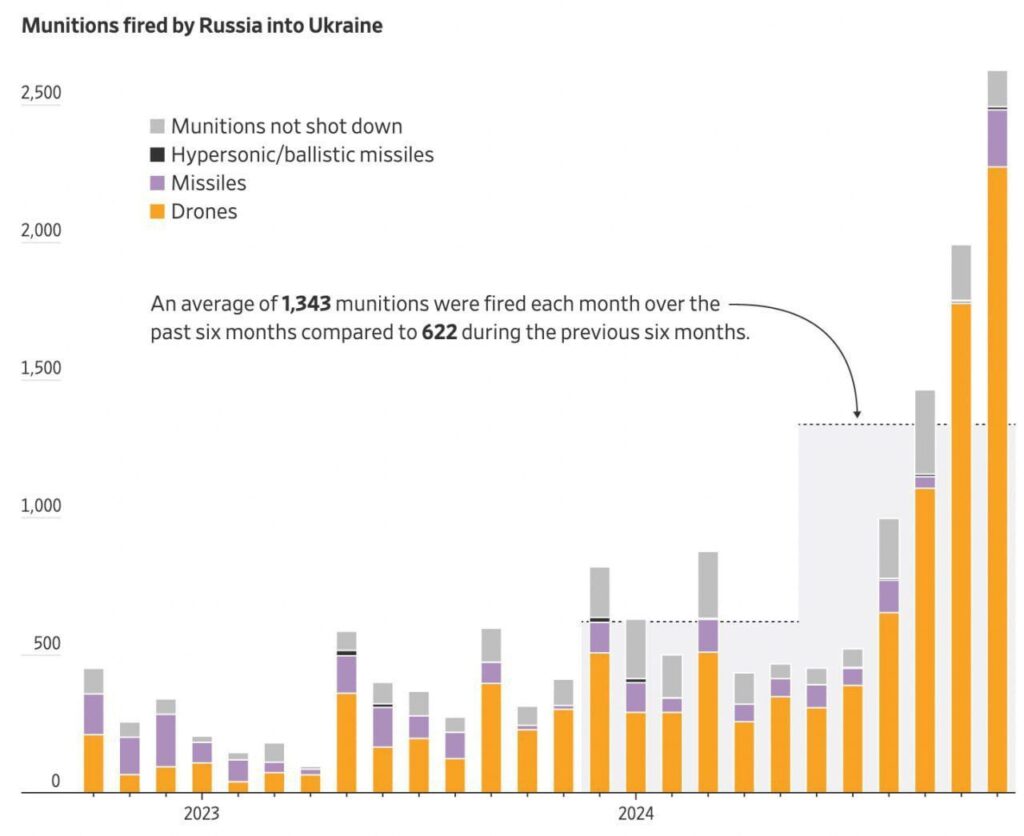
WaPo now fully admits that Ukrainian specialists aided Al-Qaeda, aka HTS, specifically on the eve of the grand offensive against Aleppo:
The article notes:
The Syrian rebels who swept to power in Damascus last weekend received drones and other support from Ukrainian intelligence operatives who sought to undermine Russia and its Syrian allies, according to sources familiar with Ukrainian military activities abroad.At what point do pro-Ukrainian Westerners have a moment of self-reflection and ask themselves: “Maybe we’re the baddies?”
 Eurasia Press & News
Eurasia Press & News
